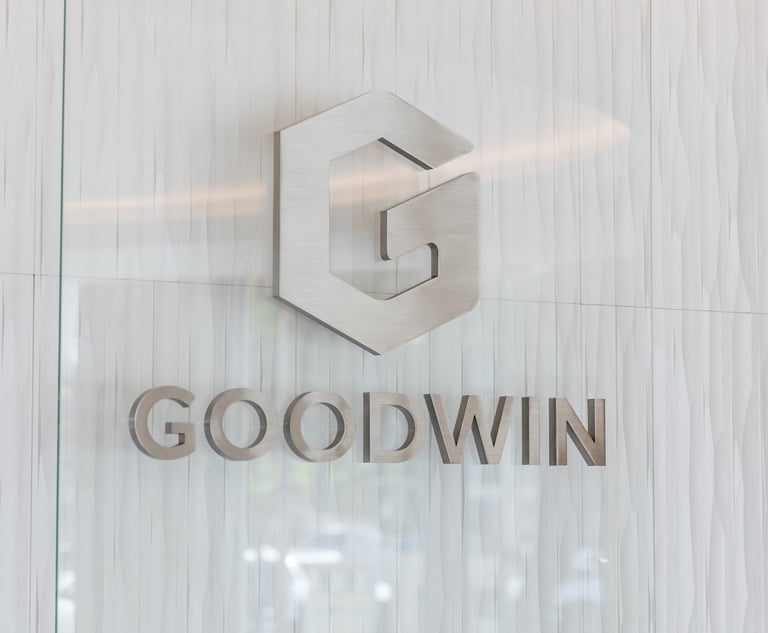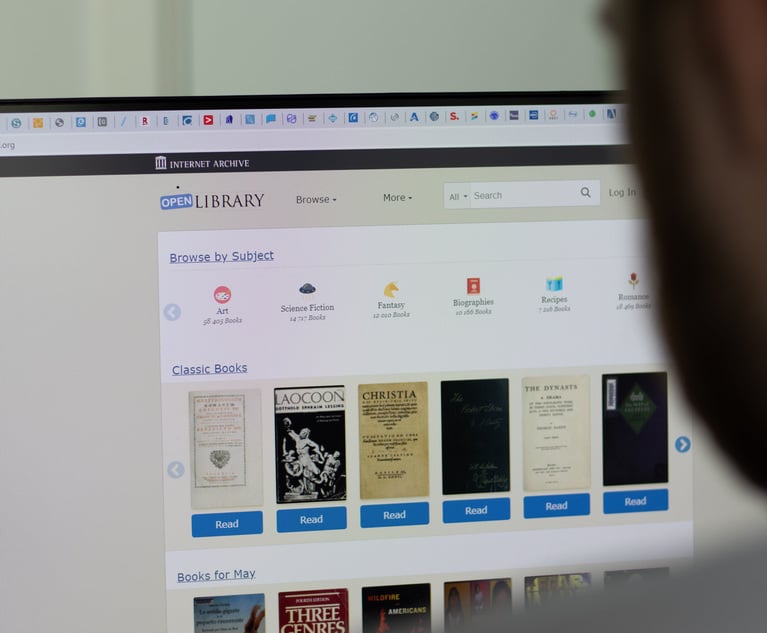Garmin Decision Offers Insights on Patent Application Drafting
In his Patent and Trademark Law column, Robert C. Scheinfeld analyzes a recent decision in which the Federal Circuit pondered whether a patent claim's preamble should act as a component of, and effectively limit the scope of, the claimed invention.
March 24, 2015 at 10:00 PM
7 minute read
The U.S. Court of Appeals for the Federal Court has had a busy February and March, rendering more than 50 decisions in only the first half of this month. One decision, in particular, stands out for the patent application draftsperson: Pacing Technologies v. Garmin Intern., No. 2014-1396, 2015 WL 668828 (Fed. Cir. Feb. 18, 2015) .
In Pacing, the Federal Circuit affirmed the district court's grant of summary judgment that Garmin's accused products do not infringe the asserted claims of Pacing's U.S. Patent No. 8,101,843. Pacing's patent is directed to a system for pacing a user and, more specifically, the patent describes a system for pacing users during activities that involve repeated motions, such as running, cycling and swimming. Preferably, the system provides the user with a tempo (for instance, the beat of a song, or flashes of light) corresponding to the user's desired pace.
Garmin's accused products, the Garmin GPS fitness watches and microcomputers, used by runners and bikers, allow users to assign a duration and target pace value to certain workouts consisting of a series of intervals. The devices display the intervals of a particular workout during operation, for example, by counting down the time for which the user intends to maintain a particular pace.
Patent Language
To establish patent infringement, a patentee must establish by a preponderance of the evidence that an accused device infringes at least one valid claim of the asserted patent. In Pacing, claim 25 of the patent was representative and reads:
This content has been archived. It is available through our partners, LexisNexis® and Bloomberg Law.
To view this content, please continue to their sites.
Not a Lexis Subscriber?
Subscribe Now
Not a Bloomberg Law Subscriber?
Subscribe Now
NOT FOR REPRINT
© 2025 ALM Global, LLC, All Rights Reserved. Request academic re-use from www.copyright.com. All other uses, submit a request to [email protected]. For more information visit Asset & Logo Licensing.
You Might Like
View All
Change on the Horizon?: 2025 Begins With Numerous Patent Bills Pending
8 minute read

IP at the Frontier of AI: Navigating the New Landscape

Trending Stories
- 1DC Bar’s Proposed Anti-Discrimination, Harassment Conduct Rule Sees More Pushback
- 2California's Chief Justice Starts Third Year With Questions About Fires, Trump and AI
- 3Justin Baldoni Sues Blake Lively and Ryan Reynolds for $400M in New Step in 'It Ends With Us' Fight
- 4Top Leadership Changes Coming for NJ Attorney General's Office
- 5SCOTUSBlog Co-Founder Tom Goldstein Misused Law Firm Funds, According to Federal Indictment
Who Got The Work
J. Brugh Lower of Gibbons has entered an appearance for industrial equipment supplier Devco Corporation in a pending trademark infringement lawsuit. The suit, accusing the defendant of selling knock-off Graco products, was filed Dec. 18 in New Jersey District Court by Rivkin Radler on behalf of Graco Inc. and Graco Minnesota. The case, assigned to U.S. District Judge Zahid N. Quraishi, is 3:24-cv-11294, Graco Inc. et al v. Devco Corporation.
Who Got The Work
Rebecca Maller-Stein and Kent A. Yalowitz of Arnold & Porter Kaye Scholer have entered their appearances for Hanaco Venture Capital and its executives, Lior Prosor and David Frankel, in a pending securities lawsuit. The action, filed on Dec. 24 in New York Southern District Court by Zell, Aron & Co. on behalf of Goldeneye Advisors, accuses the defendants of negligently and fraudulently managing the plaintiff's $1 million investment. The case, assigned to U.S. District Judge Vernon S. Broderick, is 1:24-cv-09918, Goldeneye Advisors, LLC v. Hanaco Venture Capital, Ltd. et al.
Who Got The Work
Attorneys from A&O Shearman has stepped in as defense counsel for Toronto-Dominion Bank and other defendants in a pending securities class action. The suit, filed Dec. 11 in New York Southern District Court by Bleichmar Fonti & Auld, accuses the defendants of concealing the bank's 'pervasive' deficiencies in regards to its compliance with the Bank Secrecy Act and the quality of its anti-money laundering controls. The case, assigned to U.S. District Judge Arun Subramanian, is 1:24-cv-09445, Gonzalez v. The Toronto-Dominion Bank et al.
Who Got The Work
Crown Castle International, a Pennsylvania company providing shared communications infrastructure, has turned to Luke D. Wolf of Gordon Rees Scully Mansukhani to fend off a pending breach-of-contract lawsuit. The court action, filed Nov. 25 in Michigan Eastern District Court by Hooper Hathaway PC on behalf of The Town Residences LLC, accuses Crown Castle of failing to transfer approximately $30,000 in utility payments from T-Mobile in breach of a roof-top lease and assignment agreement. The case, assigned to U.S. District Judge Susan K. Declercq, is 2:24-cv-13131, The Town Residences LLC v. T-Mobile US, Inc. et al.
Who Got The Work
Wilfred P. Coronato and Daniel M. Schwartz of McCarter & English have stepped in as defense counsel to Electrolux Home Products Inc. in a pending product liability lawsuit. The court action, filed Nov. 26 in New York Eastern District Court by Poulos Lopiccolo PC and Nagel Rice LLP on behalf of David Stern, alleges that the defendant's refrigerators’ drawers and shelving repeatedly break and fall apart within months after purchase. The case, assigned to U.S. District Judge Joan M. Azrack, is 2:24-cv-08204, Stern v. Electrolux Home Products, Inc.
Featured Firms
Law Offices of Gary Martin Hays & Associates, P.C.
(470) 294-1674
Law Offices of Mark E. Salomone
(857) 444-6468
Smith & Hassler
(713) 739-1250






